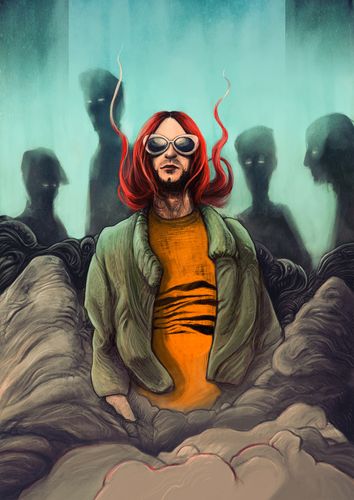
April 8, 1994. Gary Smith, an electrician, walked up to a charming house in Seattle. Through the window of the garage, he discovered the resident in a pool of blood and very much dead. The county police, who recovered a suicide letter from the spot, estimated that the death occurred almost three days before—on April 5. Name: Kurt Cobain. Profession: Musician. Cause of death: Shotgun wound to the head.
On April 11, a thousand-strong crowd—almost exclusively teenagers—gathered at the Flag Pavilion Plaza in Seattle to pay respects to their fallen hero. Only, it is not your usual vigil. The bereaved widow, Courtney Love, reads out the suicide note for the gathered audience—punctuated by sobs and expletives directed at the fallen rockstar.
I haven't felt the excitement for so many years. I felt guilty for so many years. The fact is I can't fool you, any one of you. The worst crime is faking it (Kurt Cobain, suicide note)
Equally unusual was the presence of officials from the Seattle crisis centre. One of the representatives of the crisis centre, Sue Eastgard, was at the American Association of Suicidology’s annual conference in New York when the news about Cobain hit the airwaves, writes Candace Opper in Guernica. "Then the clinic starts calling my hotel, telling me they’re inundated with calls from the Seattle media, looking for guidance on how to report his death,” Sue told Candace.
Cobain's death had raised a widespread fear of copycat suicides—such was his influence among the disillusioned youth at that time. The very first casualty of the "suicide crisis" was 28-year-old Daniel Kaspar, who went the same way as Cobain— a shotgun to his head. (However, the study conducted by a group of experts in 1996—on the "Kurt Cobain suicide crisis"—had found that the number of suicides had actually decreased from the earlier numbers of 31 to 24).
In a way, Kurt Cobain died the very way that he lived—a Schrodinger's cat for all eternity. When Kurt Cobain and Nirvana burst into the music scene in 1991 with their album Nevermind, he was considered a radical phenomenon. Their songs were dark, depressing and replete with violent imagery—representative of the pissed-off, angry generation of youth at that time. Was he gay? Not even the musician could say. Throughout his childhood, he was bullied (well documented in the path-breaking film Kurt Cobain: Montage of Heck). He never came to grips with his sexuality. In numerous interviews, he has claimed that he was unsure of his sexual orientation.
Was he a genius or an overrated junkie who wrote garbage lyrics? He never knew. The teens idolised the musician, raising him to the level of a demi-god, while the older, conservative generation was repulsed by the artist. A few days after the death of Cobain, conservative commentator Rush Limbaugh said, "Kurt Cobain was, ladies and gentleman, I just.....he was a worthless shred of human debris". Radio host Andy Rooney said on 60 minutes, "If Kurt Cobain applied the same brain to his music that he applied to his drug-infested life, it’s reasonable to think that his music may not have made much sense either.”
Throughout his life, he suffered from debilitating and recurring stomach pangs (something that left the doctors flummoxed) that finally led him to drugs like heroin. Was it real or psychosomatic? He was never sure.
On one occasion, Cobain, a vocal activist for gay rights, stood atop the podium and yelled at his audience to leave and not support him or his album if they were homophobic. Did his audience slowly come to represent everything he hated—long haired, hyper-masculine metal heads? He could never tell.
He's the one
Who like all our pretty songs
And he likes to sing along
And he likes to shoot his gun
But he don't know what it means
Don't know what it means (Kurt Cobain, In Bloom)
In songs like Smells Like Teen Spirit, which is considered as a rock anthem embodying an entire generation of disillusioned youth, was he hinting at something more? A jibe at his fans?
With the lights out, it's less dangerous
Here we are now, entertain us
I feel stupid and contagious
Here we are now, entertain us (Kurt Cobain, Smells like teen spirit)
As time passed, did the audience themselves, in the eyes of the musician, mutate into an unrecognisable organism—a legion of voices that resonated with the multitude of uncertainities within him? Did the process of writing a song, one that should have been cathartic, become an unbearable intrusion into his most private thoughts and desires.
For example when we're backstage and the lights go out and the manic roar of the crowds begins, it doesn't affect me the way in which it did for Freddie Mercury, who seemed to love, relish in the the love and adoration from the crowd which is something I totally admire and envy (Kurt Cobain, suicide note)
Did he, while performing, feel like a helpless child forced to watch a bully read out the contents of his secret diary, to gales of laughter?
Finally, did his death then become a litmus test for his supporters and audience? Did it, unwittingly, become a trial by fire for all those who professed to follow his teachings with a cult-like enthusiasm? That, he has left for us to ponder over.




